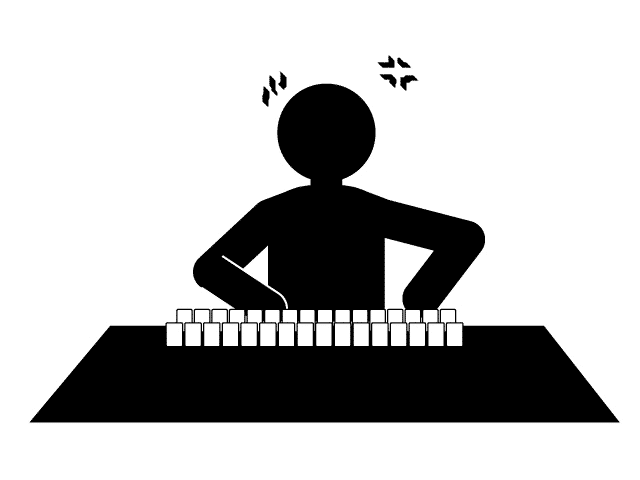Three losses in a row. The frustration builds. You start thinking "I'm never going to win again" or "I suck at this game."
Here's what's happening: you're not getting unluckier. You're sabotaging yourself. And the longer you stay unaware of this mechanism, the longer your streak will last.
How to stop your losing streak right now like a pro
If you've played mahjong for any length of time, you've experienced a losing streak. The highs and lows are inevitable when luck plays such a significant role. Even the most famous pro mahjong players slump from time to time.
But here's the critical insight: the most damaging factor in your performance comes from within.
A small losing streak triggers self-sabotage. Your play gets worse. More losses follow. This vicious cycle compounds. After four or five losses, players start making mistakes they'd never make with a clear head. Not because their skill disappeared, but because their motivation and focus did.
You don't have to keep losing more than your fair share. ~NPMahjong
One of my patrons asked how I cope with losing streaks. Here's everything I've learned about avoiding unnecessary slumps and pulling yourself out when you fall into one.
Mahjong vs Go, Shogi, or Chess
In complete information games like Go or Shogi, the stronger player wins and the weaker player loses. Almost invariably, every time.
Mahjong is different. It's a game of chance and skill combined. Less skilled players can beat experienced opponents. You can get lucky even when outmatched.
This is what makes mahjong welcoming to new players; it rewards you from time to time, no matter your experience level or opponent strength.
Is mahjong a game of luck or skill?
Both. Four players sit at the table, but you control only one of them. That's 75% outside your control, 25% within it.
A better word than "luck" is probability. You can't control what others do, but you can estimate what's likely to happen. Over the long term (thousands of games) results become 100% about skill.
You control one out of four players. That's both the frustration and the opportunity.
What counts as a losing streak?
Losing two or three games in a row isn't a losing streak. Neither is going 5 or 6 hanchan without a win.
If you think otherwise, you don't understand probability. Top mahjong players only win 30% of their games. Every time a pro sits down, they have a 70% chance of not taking first. Lose that game, sit down for another; still 70% chance of losing again.
This is the gambler's fallacy: believing that past losses make a win more likely. They don't. The probability of each game is independent of what came before.
No matter how many games you lose, you're not "due" for a win. ~NPMahjong
A pro with a 30% first-place rate has a 16% chance of going five games without winning. Let me put that in perspective: with a ryanmen wait, your ippatsu tsumo chance is 6%. Five losses in a row is almost three times more likely than hitting ippatsu tsumo.
If your win rate is below 30% (and it should be, unless you're a veteran), expect these runs even more often.

This is totally normal...
Intermediate players have a 4th place rate around 20%. The probability of two 4ths in a row? About 4%. Three in a row? Almost 1%.
Does 1% sound rare? It's not. These patterns happen constantly.
So why do extended losing streaks seem so common?
Why do losing streaks happen? Self-sabotage?
Without understanding these numbers, you become your own worst enemy.
The moment you start losing, you begin sabotaging yourself. This isn't crazy; it's a normal human reaction. Your brain perceives a threat and triggers a defense mechanism.
Here's how it works: by extending your losing streak, you get to protect your ego. Lose 2 games? That might be your fault. Lose 10? That's "bad luck" or "tilting." Nobody would blame you. You get to disconnect your losses from your perception of your true skill.
Stop doing this. The cost is enormous.
This is why proud players enter longer-than-average losing streaks. You can't choose when a streak begins, but you decide how it ends. Most slumps are self-inflicted.
"Did you start to lose because you lost motivation? Or did you lose motivation because you started to lose?"

Fight or flight
The second reason for losing streaks is harder to control: your animal instinct.
When you start losing, stress builds. Your brain can't tell the difference between a bad mahjong session and real danger. It feels threatened and triggers your fight or flight response.
Fight or flight is great when you're facing a predator in the wilderness. It's terrible for strategic thinking. Once triggered, your mental balance goes haywire. You'll need time to recalibrate before playing well again.

The worst part? Once you reach this state, there's little you can do. That's why prevention matters more than recovery.
How to prevent tilt
Tilt is the direct result of a negative mindset. Negative thoughts create perceived threats. Your amygdala hijacks your brain. You sabotage yourself.
When others win a hand, do you think:
"Others have it so easy, but it's always so hard for me."
"I wish I had this guy's luck. I'm always so unlucky."
"If it were me, I wouldn't have drawn that tile."
Stop. Right. Now.
You're wasting valuable brainpower on unproductive thoughts. Reframe them instead:
"Playing against strong luck is a chance to test my skills."
"If I learn to win without lucky draws, I'll dominate when luck does come."
"Mahjong is fun because it's unpredictable. If I always won, it would get boring."
Negative thinking attracts negative outcomes. Cut those thoughts out.
Why staying positive matters
Positivity is the most effective way to prevent fight-or-flight. No perceived danger means no perceived threat. No threat means no tilt.
Whenever "unfair" things happen to me, I remember these words from my friend Jangoro K, a legendary high-stakes gambler who once lost $20,000 in a single mahjong night:
"I will keep playing mahjong for many years. I'll experience poor streaks like this one many times. But if I stay cool, if I don't think about my losses during the game, if I play my current hand unphased, then no matter tonight's result, I'm already a winner." ~Jangoro K
Print these words. Pin them near your screen. This is the mental anchor that keeps me positive no matter how rough things get.
How to recognize tilt
Sometimes prevention fails. You go on tilt unexpectedly.
You might laugh it off, crack jokes, smile, but you're furious.
The signs are clear: you're not playing your best. You repeat basic mistakes and recognize them immediately after making them. You make decisions you'd never make with a clear head.
That's tilt. When the current hand ends, excuse yourself to the restroom. Wash your face. Drink water. Take a break. Then return to the table fresh.

Be aware some people will actively try to provoke you
Never play with the mindset that you need to "recover" what you lost. Especially on Tenhou, you can't "recover" lost points. But you can learn from your losses so they weren't wasted.
Lost points can't be recovered. Whether they were wasted is up to you.
How to break a losing streak
If nothing else works and you're still stuck in a spiral, here's my best advice:
Play a different game.
This isn't running away. If you're having this problem, you need perspective. Your brain needs to remember that mahjong is one game among many, not life or death.
No threat. No danger. Nothing to fear.
Go play basketball. Hit the arcades. Trade stocks. Do something else competitive. When your mahjong craving pulls you back to the tiles, return with a clear mind and your priorities straight.
Rethink your priorities
During bad streaks, your priorities get warped:
- I want to win
- I want to get better
- I want to play
That's backwards. Here's the correct order:
- Enjoy the game (and help the other 3 players enjoy it too)
- Get better at the game
- Win
Winning comes after enjoyment and improvement, not before.
When you prioritize 1 and 2, when you study every day, winning streaks follow naturally.
The bottom line
Losing streaks happen more often than you think, but they don't have to last long.
Prevention beats recovery. Prevent tilt through positive thinking. A proper mindset focuses on long-term results, enjoyment, and learning, not tonight's score.
The more losing streaks you prevent, the more winning streaks you'll have.
Now I want to hear from you: what's the longest losing streak you've experienced? Drop me a line and let's compare notes.

